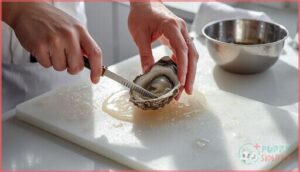This site is supported by our readers. We may earn a commission, at no cost to you, if you purchase through links.
Your dog’s nose twitches as you shuck fresh oysters at the kitchen counter, and those pleading eyes make it hard to resist sharing. But before you slip a slippery bivalve to your furry friend, you’re right to wonder if it’s safe. The short answer: yes, dogs can eat oysters, but only when they’re fully cooked, completely shell-free, and served plain.
Raw oysters carry bacterial risks that can turn a tasty treat into a trip to the emergency vet, and improper preparation can create choking hazards or digestive troubles.
Oysters pack impressive nutritional benefits—from omega-3s that boost coat health to zinc that strengthens immunity—but they also come with potential dangers like heavy metal accumulation and shellfish allergies. Understanding the difference between safe preparation and risky shortcuts will help you decide whether these ocean gems belong in your dog’s bowl.
Table Of Contents
- Key Takeaways
- Can Dogs Eat Oysters?
- Nutritional Benefits of Oysters for Dogs
- Potential Risks of Feeding Oysters to Dogs
- Raw Vs. Cooked Oysters for Dogs
- Safe Preparation Methods for Oysters
- How Much Oyster Can Dogs Safely Eat?
- Signs of Oyster Allergies or Toxicity in Dogs
- Alternatives to Oysters for Dogs
- When Should Dogs Avoid Oysters?
- Veterinary Guidance on Feeding Oysters
- Frequently Asked Questions (FAQs)
- What kind of oysters are best to feed my dog?
- Can I feed my dog canned oysters?
- What is the best way to prepare oysters for my dog?
- How much oyster should I feed my dog?
- Can puppies safely eat cooked oysters?
- Are canned or smoked oysters safe for dogs?
- Do oysters help with dog arthritis or inflammation?
- Can oysters cause diarrhea or vomiting in dogs?
- How long do cooked oysters stay fresh?
- Conclusion
Key Takeaways
- Dogs can safely eat oysters only when they’re fully cooked, completely shell-free, and served plain without seasonings, butter, or oils that could trigger digestive upset or pancreatitis.
- Cooked oysters deliver high-quality protein, omega-3 fatty acids for coat health, zinc for immune function, and iron for energy, but raw oysters carry serious bacterial risks like Vibrio vulnificus that can cause severe food poisoning.
- Portion control matters—small dogs should get 1/4 to 1/2 oyster, medium dogs 1/2 to 1 oyster, and large dogs 1-2 oysters maximum, offered only once or twice weekly as an occasional treat rather than a dietary staple.
- Dogs with shellfish allergies, pancreatitis history, or sensitive stomachs should avoid oysters entirely, and all dogs should be monitored closely for adverse reactions like vomiting, diarrhea, facial swelling, or lethargy within 24 hours of eating them.
Can Dogs Eat Oysters?
You can offer your dog oysters, but only if they’re fully cooked, shell-free, and served plain. Raw oysters carry a higher risk of bacterial contamination—pathogens like Vibrio vulnificus don’t play nice with your pup’s digestive system. Cooked oysters, on the other hand, are safer when prepared without salt, butter, or seasonings that can upset canine stomachs or trigger pancreatitis.
Remove every shell fragment before serving. Even tiny pieces pose choking hazards or can cause internal injuries. Cut the oyster into bite-sized chunks appropriate for your dog’s size, and keep portions small—think of oysters as an occasional treat, not a dietary staple.
If your dog shows adverse reactions like vomiting, diarrhea, or unusual itching after eating oysters, stop feeding them immediately and consult your veterinarian. Safe oyster feeding requires attention to detail and moderation. To better understand the terminology used here, you can explore language related resources for more information.
Nutritional Benefits of Oysters for Dogs
If you’re wondering whether oysters are worth adding to your dog’s bowl, the nutritional profile might surprise you. These little mollusks pack a serious punch regarding vitamins, minerals, and healthy fats that can support your pup’s overall health.
Let’s break down the key nutrients oysters offer and how they benefit your dog’s body.
Protein Content and Muscle Health
Oysters deliver high-quality protein—around 9–11 grams per 100-gram serving—that aids muscle growth and repair in your dog. These protein sources pack all essential amino acids canines need, making them a smart addition to balanced canine nutrition. Whether your pup’s recovering from a hike or just staying active, this nutrient balance helps maintain lean mass.
So, can dogs eat oysters for protein? Absolutely, when prepared safely. The importance of methodological rigor in scientific studies, like those on canine nutrition, can’t be overstated.
Omega-3 Fatty Acids for Skin and Coat
Beyond muscle support, your pup’s coat and skin can really shine when oysters bring EPA and DHA—long-chain omega-3 fatty acids—into the mix. These omega-3 fatty acids help with inflammation reduction and skin health, boosting canine wellness and care in a few key ways:
- Strengthened skin barrier against irritants
- Noticeable coat shine and softness
- Reduced itching from inflammatory responses
That omega balance makes oysters a standout in dog nutrition.
Zinc and Immune System Support
Another reason oysters pack a punch? They’re loaded with zinc—a mineral your dog’s immune function depends on every single day. Zinc helps white blood cells fight off infections, speeds up wound healing, and keeps skin healthy from nose to tail.
| Zinc Benefit | How It Helps Dogs | Signs of Deficiency |
|---|---|---|
| Immune Defense | Aids antibody production | Frequent infections |
| Wound Healing | Accelerates tissue repair | Slow-healing cuts |
| Skin Health | Maintains barrier integrity | Dry, flaky patches |
| Metabolism Support | Powers enzyme reactions | Low energy, appetite loss |
| Olfactory Function | Regulates scent detection | Reduced sense of smell |
Just remember, a little goes a long way with this mineral balance booster—too much zinc can throw off copper levels. When fed occasionally, though, oysters offer solid nutrient absorption and health supplements without overdoing it, giving your pup’s canine wellness and care a natural immune boost that aids overall dog health. For more guidance on building balanced meals that include these nutrient-rich treats, check out homemade food recipes for West Highland White Terriers that prioritize safe ingredient choices.
Iron and Blood Health
Your dog’s energy and vitality depend on strong Blood Health, and oysters deliver heme iron that’s quickly absorbed to fuel Red Blood Cells. This mineral powers Oxygen Transport throughout the body, fighting Iron Deficiency and supporting Hematological Balance during growth or recovery. A homemade dog food delivery service can ensure your pup receives iron-rich ingredients like oysters in perfectly portioned, balanced meals.
A small oyster treat can boost canine health without overloading calories, making oyster safety for dogs worth considering in dog nutrition and health conversations—just keep portions modest. If you’re exploring other seafood options, you might also wonder can dogs eat snow crab and how it compares nutritionally.
Potential Risks of Feeding Oysters to Dogs
While oysters pack some serious nutritional punch, they’re not without their downsides for your dog. From bacterial nasties lurking in raw shellfish to the very real danger of choking on sharp shells, there’s plenty to watch out for.
Let’s break down the main risks you need to know before offering your pup this ocean treat.
Bacterial Contamination and Food Poisoning
Raw shellfish can harbor dangerous bacteria like Vibrio vulnificus, which thrives in warm coastal waters. When your dog eats contaminated oysters, food poisoning can strike fast—think vomiting, diarrhea, lethargy, and fever within hours.
These bacterial risks seriously impact gut health and overall wellbeing. Seafood safety isn’t just a human concern; shellfish poisoning affects dogs too, making proper oyster safety for dogs absolutely critical.
Heavy Metal and Toxin Exposure
Oysters filter-feed in coastal waters, accumulating heavy metals like mercury, lead, and cadmium over time. This toxin accumulation poses real contaminant risks to your dog’s health, potentially causing metal poisoning with repeated exposure.
While seafood safety regulations exist, exposure limits vary, and toxicity testing doesn’t guarantee every oyster is clean—so you’re playing a risky game with contaminated shellfish, even when cooked properly.
Shellfish Allergies in Dogs
Though rare, some dogs develop food allergies to shellfish proteins, triggering immune responses that range from mild to severe. Canine hypersensitivity to seafood can emerge suddenly, even if your pup enjoyed shellfish before.
You’ll notice allergy symptoms like itching, hives, facial swelling, or digestive upset after your dog eats oysters. Food sensitivities aren’t worth the risk—safer protein sources exist without shellfish reactions.
Choking Hazards From Oyster Shells
Even a small shell fragment can turn a nutritious treat into an emergency room visit. Oyster shells pose serious physical dangers to dogs, from airway obstruction to intestinal perforation.
Before offering oysters to your pup, follow these shell removal tips:
- Inspect each oyster for hidden shell fragments after shucking
- Run your fingers across the meat to detect sharp edges
- Rinse thoroughly under running water to wash away particles
- Double-check before serving—choking prevention methods start here
- Discard shells immediately where your dog can’t access them
Intestinal blockage prevention begins with vigilant preparation.
Raw Vs. Cooked Oysters for Dogs
Regarding oysters, preparation makes all the difference for your dog’s safety. Raw oysters carry serious risks that cooked ones simply don’t, so understanding this distinction can protect your pup from unnecessary illness.
Let’s break down what makes each option risky or safe.
Dangers of Raw Oysters
Think of raw oysters as a gamble you don’t want to take with your dog’s health. Vibrio infection and bacterial contamination from uncooked shellfish can trigger severe foodborne illness in minutes, not hours.
Raw oysters are a gamble you don’t want to take with your dog’s health—bacterial contamination can trigger severe illness in minutes
Here’s what raw oyster risks really look like:
| Raw Oyster Danger | Impact on Your Dog |
|---|---|
| Vibrio bacteria | Vomiting, diarrhea, severe GI distress |
| Heavy metals/toxins | Neurological issues, organ damage |
| Sharp shell fragments | Internal injury, choking hazard |
Raw oysters sidestep the one thing that protects your pup—heat. Without cooking to kill pathogens, you’re serving up shellfish poisoning on a half-shell. Food safety and handling matter tremendously here, especially since seafood safety for pets isn’t negotiable when bacteria are involved.
Safety of Properly Cooked Oysters
Cooking transforms the equation entirely. When you steam or boil oysters until they hit 145°F internally, you’re inactivating the bacteria that make raw shellfish so risky. Proper cooking methods and oyster storage protect your dog’s health and wellness without sacrificing nutrient retention.
Here’s how safe preparation changes everything:
| Cooking Method | Temperature | Bacterial Inactivation |
|---|---|---|
| Steaming | 145°F+ | Kills Vibrio, most pathogens |
| Boiling | 212°F | Maximum pathogen destruction |
| Pan-searing | 145°F+ internal | Effective when fully cooked |
Cooked oysters for dogs mean food safety and handling you can actually control. Just skip the butter, garlic, and salt—plain is perfect for seafood safety for dogs.
Safe Preparation Methods for Oysters
If you’ve decided to share oysters with your dog, the way you prepare them matters just as much as the oysters themselves. A few simple steps can help you turn this nutrient-rich shellfish into a safe, enjoyable treat for your pup.
Let’s walk through the essentials of oyster prep that’ll keep your dog’s tail wagging—and their stomach happy.
Removing Shells Completely
Before your dog can enjoy oyster meat, you need to get those shells out of the picture entirely. Shell removal tips aren’t optional—they’re essential for safe preparation methods. Here’s how to handle oyster meat extraction while preventing shell fragment problems:
- Use a dull knife or oyster shucker to pry open the shell without crushing it
- Detach the meat cleanly using gentle, controlled movements
- Inspect each oyster surface for loose or jagged pieces
- Wipe away visible debris with a clean cloth
- Rinse the extracted meat under cold running water
Work on a sanitized surface to keep bacteria away.
Cooking Without Seasonings or Oils
Once your shells are gone, plain preparation is key—no butter, garlic, or salt. Gentle steaming or boiling works best for cooking seafood safely.
These lean cooking methods preserve omega-3s and zinc while killing bacteria that threaten dog health and wellness. Skip the seasonings entirely; cooked oysters don’t need flavor boosters that can harm your pup. Nutrient retention stays high with safe handling and moderate heat.
Cutting Oysters Into Bite-Sized Pieces
After steaming, size matters—oysters can feel slippery going down. Here’s your safe cutting technique for oyster preparation:
- Slice each oyster into uniform pieces, roughly 0.5 to 1 centimeter across
- Trim away any gritty connective tissue
- Double-check for shell fragments
- Use a sharp knife to avoid crushing the meat
These bite-size portions prevent choking while making seafood easier for your dog to digest and enjoy.
How Much Oyster Can Dogs Safely Eat?
Even though oysters pack serious nutritional benefits, they’re not meant to replace your dog’s regular meals. Think of them more like a special occasion treat, not a daily staple.
Let’s break down exactly how much is safe, how often you can offer them, and what warning signs to watch for.
Appropriate Portion Sizes
Regarding serving sizes, less is definitely more with oysters. For dogs under 20 pounds, stick to 1/4 to 1/2 oyster. Medium pups (20–50 pounds) can handle 1/2 to one whole oyster, while larger dogs over 50 pounds shouldn’t exceed one oyster per serving.
Remember, these nutrient-dense seafood treats pack serious nutrition into small portions—your dog’s caloric intake and dietary restrictions matter here.
Frequency of Feeding
Occasionally works best when planning your dog’s oyster-eating schedule—think of seafood treats as special-occasion nutrition, not everyday staples. Most veterinarians recommend limiting oysters to once per week or less, ensuring dietary balance without overwhelming your pup’s system.
This meal frequency approach respects portion control principles while maintaining moderation, letting you incorporate oysters into feeding schedules without disrupting your dog’s complete, nutrient-balanced diet.
Monitoring for Adverse Reactions
Watch your dog closely for the first 24 hours after offering oysters, tracking any vomiting, diarrhea, or lethargy in a symptom diary. Reaction timing matters—allergies often show up as itching or facial swelling within hours, while shellfish poisoning symptoms may appear later.
If you notice anything unusual, veterinary advice through a consult beats guesswork, and emergency response saves lives when reactions escalate.
Signs of Oyster Allergies or Toxicity in Dogs
Even when oysters are prepared safely, some dogs can have unexpected reactions ranging from mild discomfort to serious illness.
Knowing what to watch for can help you catch problems early, before they escalate into something worse. Here’s how to recognize the warning signs that your dog isn’t tolerating oysters well.
Common Allergy Symptoms
If your dog’s sensitive to shellfish, allergic reactions can show up fast—usually within minutes to a few hours after munching on oysters. Watch for skin irritation like hives or facial swelling, gastro issues including vomiting or diarrhea, and serious anaphylaxis signs such as wheezing or throat tightness.
Food sensitivities vary, so food allergies deserve your attention when exploring new dog treats for pet wellness.
Signs of Food Poisoning
Food poisoning from oysters hits fast—vomiting often kicks in within 1 to 24 hours, followed by diarrhea (sometimes bloody) that signals gastrointestinal trouble. These symptoms point to bacterial contamination or toxin exposure, making pet food safety vital when exploring new treats like oysters for dogs with food allergies.
Your dog might show lethargy, abdominal pain when touched, or even labored breathing if toxicity signs worsen.
What to Do if Your Dog Reacts
If your dog starts vomiting, shows lethargy, or develops facial swelling after eating oysters, contact your vet immediately—don’t wait for reaction symptoms to worsen. Emergency care matters most for difficulty breathing or collapse.
Poison control and vet consultation can guide you through next steps, while future allergy testing helps protect your dog’s health benefits.
Remove all oysters and monitor closely, following veterinary advice and guidance for animal health and nutrition decisions.
Alternatives to Oysters for Dogs
If oysters feel too risky for your dog, or if your pup simply doesn’t like them, plenty of other protein-rich options can deliver similar nutritional benefits without the worry.
Some seafood choices are naturally safer and easier on your dog’s digestive system, while other protein sources offer their own unique health perks.
Let’s look at a few solid alternatives that keep tails wagging and bodies thriving.
Safer Seafood Options
If you’re looking for safer seafood options beyond oysters, oily fish like salmon and sardines deliver powerful omega-3 fatty acids and high-quality protein with fewer shellfish-specific worries.
Whitefish such as cod brings lower mercury levels to the table, while fully cooked shrimp (deshelled, of course) can work in tiny amounts—just watch for sodium and start slow to make sure your pup’s tummy stays happy.
Other Healthy Protein Sources
Beyond seafood, lean chicken and turkey give your dog clean protein without the fuss, while eggs pack all essential amino acids plus choline for brain health.
Plant proteins like lentils and chickpeas add fiber, and plain Greek yogurt offers calcium with probiotics—though some pups don’t tolerate dairy well.
Fish oil capsules can deliver omega-3 fatty acids if whole fish feels tricky.
When Should Dogs Avoid Oysters?
While oysters can be a healthy treat for many dogs, they’re not right for every pup. Some dogs should steer clear of oysters entirely due to specific health conditions or sensitivities.
Let’s look at which dogs fall into the “better safe than sorry” category.
Dogs With Shellfish Allergies
True shellfish sensitivity strikes a small subset of dogs—usually under 5% of allergy cases—but when it hits, symptoms like hives, facial swelling, or itching appear fast. Canine hypersensitivity to oysters involves IgE-mediated reactions, and allergy testing through your vet can confirm food intolerance.
If your dog’s already reacted to crustaceans or mollusks, skip oysters entirely—immunology research shows cross-reactivity between shellfish proteins is real.
Dogs Prone to Pancreatitis or Sensitive Stomachs
If your dog’s battled pancreatitis or suffers frequent vomiting and diarrhea, oysters aren’t worth the gamble. Pancreatitis management demands low-fat diets, and even a small serving can overstimulate the pancreas.
Sensitive stomach cases need gentle, consistent foods—oysters’ richness often backfires. Dietary adjustments for gastrointestinal health mean sticking to lean proteins your vet approves, protecting your dog’s comfort and long-term canine nutrition without unnecessary risk.
Veterinary Guidance on Feeding Oysters
Before you toss an oyster into your dog’s bowl, it’s worth having a conversation with your veterinarian. Every dog has unique health needs, and what works for one pup mightn’t suit another.
Here’s what vets usually consider when giving the green light on oysters.
Consulting Your Vet Before Offering Oysters
Before you introduce oysters into your dog’s meal plan, schedule a vet consultation. Your veterinarian will perform a health screening to assess whether oysters fit your pet’s unique needs, especially if your dog has a history of pancreatitis or shellfish sensitivities.
This pet owner guidance ensures safe oyster introduction while supporting overall animal nutrition and veterinary care customized to your dog’s dietary planning.
Incorporating Oysters Into a Balanced Diet
A smart diet planning approach treats oysters as a healthy snack, not a main course. When you’re building balanced meals for pet wellness, oysters deliver oyster nutrition—omega-3 fatty acids, zinc, and protein—without replacing complete dog nutrition foundations.
- Add one steamed oyster (shell-free) to your dog’s meal once or twice weekly
- Keep oysters under 10% of daily calories to maintain canine diet balance
- Pair oysters with regular pet food for complete nutrition coverage
- Rotate oysters with other seafood like salmon for variety in healthy snacks
- Track your dog’s response and adjust portions based on vet feedback
Frequently Asked Questions (FAQs)
What kind of oysters are best to feed my dog?
You’ll want plain, fully cooked oysters from reputable fisheries—no sauces, no shells, nothing fancy. Farm-raised from clean waters beat wild-caught every time, and freshness matters more than you’d think for shellfish safety and dog nutrition.
Can I feed my dog canned oysters?
You can offer canned oysters occasionally, but they’re saltier and often packed with preservatives that plain cooked oysters don’t have.
Rinse them well, skip anything with sauces, and keep portions tiny.
What is the best way to prepare oysters for my dog?
Steam or boil oysters plain—no seasonings, oils, or oyster sauce. Remove shells completely to prevent choking. Cut into small, bite-sized pieces suitable for dog treats. Fresh, properly cooked oysters beat raw oysters every time.
How much oyster should I feed my dog?
Think of oysters as a “special occasion” food rather than daily fare.
For small dogs, offer 1/4 to 1/2 oyster; medium dogs can handle 1/2 to 1; large dogs, 1-2 maximum—once or twice weekly.
Can puppies safely eat cooked oysters?
Puppies can technically eat small amounts of plain, fully cooked oysters, but it’s not recommended. Their developing digestive systems are sensitive, and shellfish allergies can emerge quickly.
Safer protein sources better support puppy nutrition and pet wellness.
Are canned or smoked oysters safe for dogs?
Both canned and smoked oysters carry added salt, oils, and preservatives—smoked varieties may introduce nitrites—that outweigh any nutritional benefit.
Stick with plain, cooked fresh oysters instead, or skip oysters altogether for safer seafood alternatives.
Do oysters help with dog arthritis or inflammation?
Oysters contain omega-3 fatty acids that may help reduce inflammation, but evidence for arthritis management in dogs is limited.
Dedicated fish oil supplements offer more consistent joint health benefits under veterinary guidance.
Can oysters cause diarrhea or vomiting in dogs?
Yes, contaminated oysters can trigger gastrointestinal risks like vomiting or diarrhea in dogs through foodborne illnesses, oyster toxins, or shellfish reactions.
Canine digestion struggles with spoiled seafood, making pet food safety and proper preparation essential for dog health benefits.
How long do cooked oysters stay fresh?
Once cooled, cooked oysters stay fresh in the refrigerator for up to three days when stored below 40°F.
For longer storage, freeze them within two months, though texture may suffer after thawing.
Conclusion
Cooked oysters offer your dog protein, omega-3s, and immune-boosting zinc—but raw ones risk bacterial infection and toxin exposure. Shell-free preparation matters. Plain cooking matters. Portion control matters.
Before you answer “can dogs eat oysters” with a confident yes, consult your vet about your dog’s health history, introduce this treat gradually, and watch for allergic reactions.
When prepared correctly and fed sparingly, oysters can safely complement your dog’s diet without compromising their wellbeing.



















